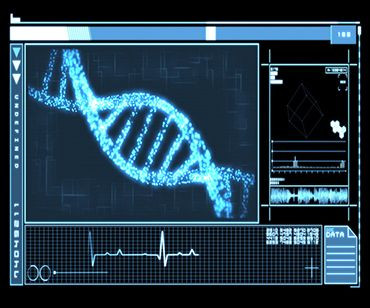The ease of accessing health information online has revolutionized personal healthcare, and one of the most intriguing advancements is the Dna Test Online. For a relatively small fee and from the comfort of your home, you can order a kit, send in a saliva sample, and unlock what seems like the secrets held within your genes. Companies offering direct-to-consumer (DTC) genetic tests promise insights into everything from disease predispositions like breast cancer and Alzheimer’s to traits such as hair loss susceptibility, and even compatibility with a potential partner. However, beneath the allure of convenience and self-discovery lies a complex web of terms and conditions that many users overlook. When engaging with a dna test online, are you fully aware of the implications of the contracts you are agreeing to?
 DNA genetic code structure visual representation for online DNA test information.
DNA genetic code structure visual representation for online DNA test information.
In today’s digital age, contracts are ubiquitous. We encounter them daily in the form of clickwrap or browsewrap agreements when using social media, streaming services, or simply browsing websites. These agreements, often lengthy and filled with legal jargon, govern our interactions with online platforms. Similarly, the burgeoning dna test online industry relies heavily on these digital contracts to define the relationship between companies and consumers. While the allure of uncovering your genetic blueprint is strong, the reality is that most users proceed without fully understanding the fine print. Are consumers truly aware of what they consent to when they click “I agree” for a dna test online? The contracts, often mirroring those of large tech corporations, may contain standardized terms that fail to adequately address the unique sensitivities surrounding genetic information. In some instances, particularly within regions like the UK and EU, certain terms might even be classified as unfair under consumer protection regulations.
Unpacking the Privacy Paradox of DNA Test Online
My in-depth review of over 70 contracts from DTC health testing companies underscores a critical point: consumers need heightened awareness regarding the implications of engaging with a dna test online. Beyond the sometimes-questionable validity of health claims made by certain providers, these tests introduce significant privacy and data security concerns. Your DNA sequence is profoundly personal; it’s a unique identifier that can potentially reveal not only your own health predispositions but also information about your relatives, both known and unknown.
The insights gleaned from a dna test online can be deeply sensitive, encompassing risks for debilitating conditions such as Alzheimer’s, various cancers, and diabetes, alongside other personal traits. As genomics advances, the scope of information derivable from your DNA continues to expand, potentially revealing unforeseen aspects of your health and lifestyle.
Furthermore, with the increasing use of biometric data in security systems, your genetic code could, in the future, become integrated into personal identification and security protocols. Imagine your DNA sequence linked to your financial accounts. In such a scenario, the implications of insecure data storage or unauthorized data sharing become profoundly serious. While you can change a password, your genetic code is immutable.
The digital landscape is unfortunately riddled with examples of companies struggling to safeguard sensitive user information. Data breaches and cyberattacks are increasingly common, highlighting vulnerabilities in data security across various industries. Within the dna test online sector, companies often secure substantial intellectual property rights through their contract terms. By agreeing to these terms, consumers may inadvertently relinquish certain rights to their DNA samples and the resulting genetic data.
Navigating Data Access and Control in DNA Test Online Services
Therefore, it is imperative to understand how companies offering dna test online services manage your data. Key questions to consider include: How is your genetic information stored? What is the duration of data retention? Who has access to your data within the company? With whom might your data be shared, and for what purposes? Your genetic profile, rich with personal information, could be commodified, potentially sold to third-party entities for targeted marketing, leveraging the intimate details contained within your DNA.
Moreover, consider the scenarios of company acquisition, dissolution, or data breaches. What safeguards are in place to protect your data in these events? And what recourse do you have if you decide to withdraw consent and request data deletion? Reflect on situations where you might regret undergoing a dna test online, such as tests for paternity or infidelity taken during moments of uncertainty. You might later object to the indefinite storage of your child’s DNA and need clarity on data retention policies.
Alarmingly, even diligent contract review might not offer complete protection. Many contracts for dna test online services include clauses that grant companies the right to modify terms at any time, often without direct notice to users. This means that even if the initial contract seems acceptable, subsequent changes could permit data usage in ways you find objectionable. This could extend to sharing your genetic information with marketing firms, employers, insurance providers, or even law enforcement agencies.
While time may seem scarce, dedicating time to thoroughly review the terms and conditions associated with a dna test online is a crucial step in informed decision-making. Given the sensitive nature of these services, robust and effective regulation is essential to safeguard consumer rights and privacy. While hoping for improved contract transparency in the future, a proactive approach to understanding the terms and conditions associated with all online services, especially those handling deeply personal data like dna test online, is paramount.
This article is adapted from an article originally published on The Conversation. Read the original article.
